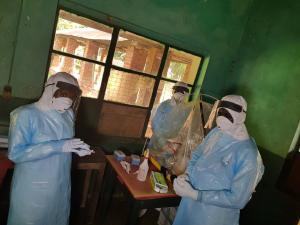Cluster of presumptive Ebola cases in North Kivu in the Democratic Republic of the Congo
1 August 2018, Kinshasa/Geneva - The Government of the Democratic Republic of the Congo announced today that preliminary laboratory results indicate a cluster of cases of Ebola virus in North Kivu province. The announcement was issued little more than a week after the Ministry of Health declared the end of an outbreak in Equateur Province in the far western part of the country, some 2500 km from North Kivu.
The Ministry of Health of the Democratic of the Congo (DRC) informed WHO that four out of six samples tested positive for Ebola virus at the Institut National de Recherche Biomédicale (INRB) in Kinshasa. Further testing is on-going.
“Ebola is a constant threat in the DRC,” said Dr Tedros Adhanom Ghebreyesus, WHO Director-General. “What adds to our confidence in the country’s ability to respond is the transparency they have displayed once again. Working closely with the Ministry of Health and partners, we will fight this one as we did the last.”
The Government was quick to provide public updates, with press releases on 30 July and 1 August.
“Since we are coming out of another Ebola outbreak, we have kept staff and equipment in place,” said Dr Matshidiso Moeti, WHO Regional Director for Africa. “This allows us to have a head start in response to this cluster.”
The majority of the cases are in the Mangina health area which is 30 kilometres from the city of Beni. “This new cluster is occurring in an environment which is very different from where we were operating in the northwest,” said Dr Peter Salama, WHO Deputy Director-General, Emergency Preparedness and Response. “This is an active conflict zone. The major barrier will be safely accessing the affected population.”
North Kivu hosts over 1 million displaced people. The province shares borders with Rwanda and Uganda with a great deal of cross border movement due to the trade activities. WHO will continue to work with neighbouring countries to ensure health authorities are alerted and prepared to respond.
Spokesperson / WHO
Telephone: +41 22 791 4458
Mobile: +41 79 203 6715
Email: hartlg [at] who.int (Subject: RE) (hartlg[at]who[dot]int)



